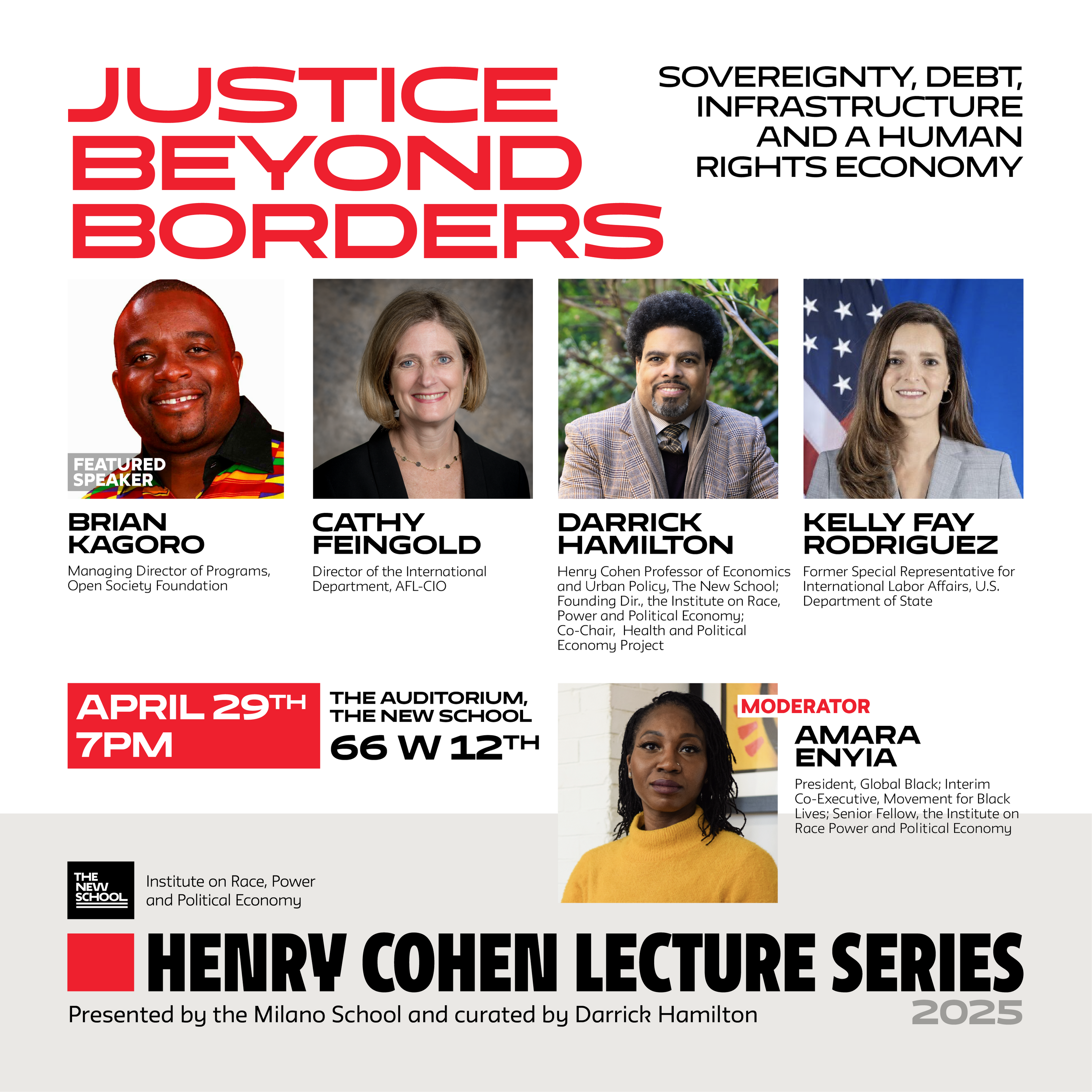
- This event has passed.
2025 Henry Cohen Lecture Series: Justice Beyond Borders
April 29 @ 7:00 pm - 9:00 pm

Join us at The New School’s Auditorium on Tuesday, April 29 as our 2025 Henry Cohen Lecture Series continues with a panel discussion on the changing international, economic, and geopolitical environments
Speakers will explore key economic policies for promoting inclusive economic rights and the role of solidarity among different stakeholders.
Speakers:
- Brian Kagoro, Managing Director, Programs, Open Society Foundation
- Cathy Feingold, Director, International Department, AFL-CIO
- Kelly Fay Rodríguez, Former Special Representative, International Labor Affairs, U.S. Department of State
- Amara Enyia, Senior Fellow, Institute on Race, Power and Political Economy; Co-Executive, Movement for Black Lives; President, Global Black
- Darrick Hamilton, Founding Director, Institute on Race, Power and Political Economy
This event is part of the 2025 Henry Cohen Lecture Series, which brings leading thinkers, changemakers, policymakers, journalists, and activists to The New School to present their perspectives and explore the intersections of race, social stratification, and political economy that inspire economic and racial justice.
Register Now
Presented in partnership with the Institute on Race, Power and Political Economy and the Milano School of Policy, Management, and Environment at The New School.
EVENT RECAP
Justice Beyond Borders
By Madeline Neighly, Senior Strategist and Researcher
At a moment marked by deep geopolitical uncertainty and economic upheaval, the event Justice Beyond Borders convened a vital conversation on sovereignty, debt, infrastructure, and the pursuit of a human rights-centered economy. The panel featured Brian Kagoro (Open Society Foundations), Darrick Hamilton (The New School), Cathy Feingold (AFL-CIO), Kelly Fay Rodríguez (former U.S. State Department Special Representative), and Amara Enyia (Global Black Collective), and offered a wide-ranging analysis of global economic justice rooted in history, power, and solidarity. The panel was bookended by remarks from The New School President Joel Towers situating the university in this moment as one with a history and future of resisting fascism and Dean Alex Aleinikoff reminding the audience that it is not enough to push back, we must push forward.
Kagoro opened with a sobering critique of international economic structures, noting how historical systems of extraction—from slavery to structural adjustment—continue to shape global inequality. He framed the present as a time of reckoning, where questions of dignity, value, and humanity intersect with the architecture of international finance and histories of colonization, exploitation, and extraction.
After Kagoro’s context setting, the panelists emphasized that economic transformation requires more than policy shifts—it demands new norms and solidarities and that we ask new questions. Echoing the need for a new paradigm, Hamilton stressed that neoliberalism not only naturalizes poverty but weaponizes debt as a tool of control. He urged the audience to define justice as ensuring people are resourced to thrive, not just survive.
Speaking to the dual task of resisting retrenchment and building inclusive structures that empower communities long excluded, the panelists warned against romanticizing old institutions while recognizing the urgency of defending hard-won rights. Unions and movements, they argued, must evolve—with a focus on unions becoming more inclusive, imaginative, and responsive to informal and globalized labor. Kagoro reminded us that the weaponization and privileging of identities is intentionally used to block solidarity, obscuring the fact that our struggles are linked against common threats of corporate financialization, militarization, extraction, and exploitation by the wealthy elites.
The discussion also explored the implications of artificial intelligence, with panelists underscoring the need for democratic governance of technology. Hamilton and Kagoro warned that without addressing ownership, AI risks reinforcing global hierarchies and racialized inequities.
Ultimately, the event challenged attendees to imagine an economy grounded in human rights, where infrastructure investment, fair taxation, labor rights, and global solidarity are not fringe ideas, but foundational. As Kagoro concluded, justice beyond borders requires more than reform—it requires courage, vision, and the collective will to build what has not yet been written.
